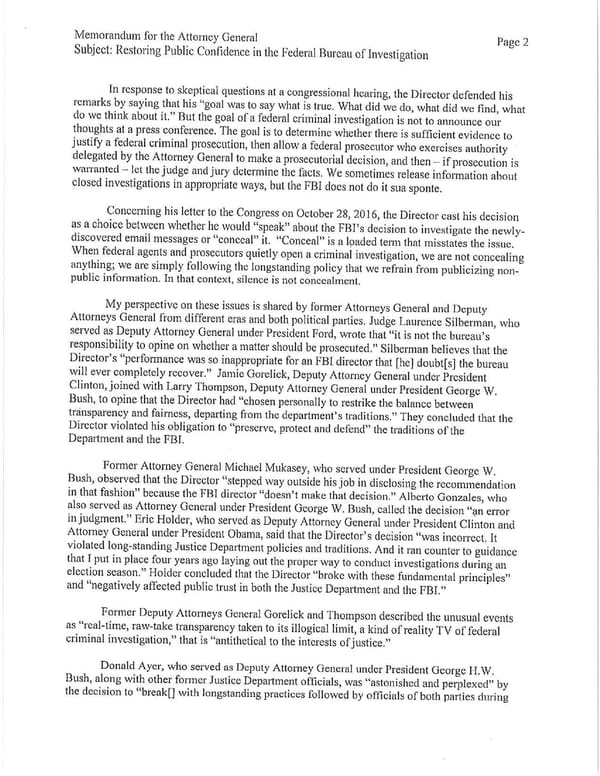Memorandum for the Attorney General Page 2 Subject: R estoring Pub lic Confid ence in the Feder al Bureau of Investigat ion In r esponse to skeptical questions at a congressional h earing, the Director def e r nded his emarks by saying th at his "goal was t o say what is true. What did we do, what did we find , do we t what hink about it." But the goal of a federal criminal investigation i thoughts at a s not to amwunce our press conference. The goal is to determine whet justify her there is suffi cient evidence to a federal criminal prosecution, then allow a federal prosecutor who exe del rcises authority egated by the Attorney General to make a prosecu tori al decision, and th en - if wananted- let the judge and jury prosecution is determine t closed investigations in appropriate he facts. We somet imes release inform ation about w ays, but the FBI does not do it sua sponte. Concerning his l etter to the Congress on Octo ber 28, 2016, the Direct or as a cast his decision choi ce betw een whether h e would "speak" about the FBI's discovered email m decision to investigate the newly- ess ages or "conceal " it. "Conceal>' is a l When federal agents and prosecutors:>aded term that misstates the issue. s qui etly open a crim inal inves tigat ion, we are not conceal anyt hing; ing p we are simply following the longstanding policy that we refrain from publicizin g non- ubli c information. In that context, silence i s not concealment. My perspective on thes e i ssues is shared by fo rmer Attorneys General a Atto rneys G nd Deputy ener al from di fferent eras and both politica l served as D parties. Judge Laurence Silberman, who eputy Attorney General unde r President Ford, wrote that "it r is not the bureau's esponsibility to opine on whether a matt er shou l d be prosecuted." Silberman believes that t Director's he "performance was so inappropriat e for an FBI director that [ will ever completely r he] doubt[s] the bureau ecover." Jamie Gorel i ck, Deputy Attorney General un d Clinton, jo er President ined with Larry Thompson, Depu ty Attorney General under President George W. Bush, to opine that the Dir ecto r had "chosen personally to rest rike tra nsparenc y the balance between and fairness, departing from the department 's Director viol ated his obligation to "prtraditions." They concluded that the eserve, protect and defend" the traditi on s of Department and the FBI. the Fotmer Attorney Gene r al Michael Mukasey, who served unde r Pres i Bush, observed that the Director "sdent George W. tep ped way outside his job in in disclo sing the recommendation tha t fashion " because the FBI director "doesn't make that decisi on . also served as Attorney General u" Alberto Gonzales, who nder President G eorge W. Bush, call ed the decision
 White House Fires James Comey Page 3 Page 5
White House Fires James Comey Page 3 Page 5